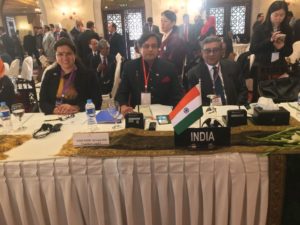India participates in the Asian Parliamentary Assembly in Pakistan
As 70 parliamentary members from 23 countries meet in Islamabad discussing the odds of forming an EU-like co-operational structure, the strategic presence of the Indian delegation just ahead of the meeting of the Indus Water commissioners is speculated to be an interesting chapter in the bilateral relationship of India and Pakistan.
The three-member Indian delegation led by Shashi Tharoor and two other Members of the Parliament (MPs) Meenakshi Lekhi and Swapan Dasgupta reached Pakistan on Tuesday. The conference got underway on March 14 with the inaugural ceremony of Meeting of Special Committee for Creation of Asian Parliament (SCCAP) and Standing Committee on Political Affairs, Asian Parliamentary Assembly (APA). Slated to conclude today, this important high-profile congress hosted by Senate of Pakistan in Islamabad was observed as the first step towards creating a parallel forum where the countries in Asia can decide their own destiny devoid of the influence of Western Imperialism.
The Chairman of the Senate, Mian Raza Rabbani, in his inaugural speech, called out to the parliamentarians of Asia to come together as a single unit to address the suffering of the people they represent. “If we were unable to find an indigenous solution for the problems of our own people, history will not forgive us,” Rabbani said in his speech.
He said that Asia is a land of natural resources, but, these resources were exploited by western imperialism. He remarked that Asia still continues to suffer through neo-colonialism. He pointed out the changed context of the world, highlighting consequences of BREXIT and US Presidential elections. Raza Rabbani, as per a press release of the Senate of Pakistan, said that the rise of white racism is a threat to the Asian region and it is this threat that Asia comes across. He cautioned that Asia must counter this threat and look for its destiny. He gave an idea that the people of Asia will lose hope in their Parliaments if the present generation failed to rise up to their expectations. He exclaimed that this meeting is a positive beginning, moving towards narrowing our distances. He hoped that the meeting, which is taking place at a very high time, would produce good results.
Indian delegation in the official group photo of MPs attending the #AsianParliamentaryAssembly Political Cmt in Islamabad @M_Lekhi @swapan55 pic.twitter.com/58cugnAB5B
— Shashi Tharoor (@ShashiTharoor) March 14, 2017
India’s position looks apprehensive
The Asian Parliamentary Assembly (APA) conference, held in Murree, witnessed a new leaf in the bilateral relationship between India and Pakistan. This Indian delegation’s visit to Pakistan is the first one after the Uri terror attack in September 2016, after which India also boycotted the SAARC Summit hosted by Pakistan.
The upcoming Indus Water meet, to be held in Lahore on March 19-20, is another chapter that comes in focus. Although the calls of mutual integration gain voice in Islamabad, senior senators from India, on Friday, have downplayed the upcoming meeting and will rather keep it to technical matters. Allegedly, all political aspects related to the implementation of the Indus Waters Treaty will not be discussed from India’s table. Slated to become the 113th meeting since 1960, the commission over the years have agreed to mutually convenient dates and agendas but have found no solution to a problem that finds its roots in a five-decade political unrest between the two countries.
Moreover, Shashi Tharoor’s meeting with the cricketer-turned-politician, Imran Khan, now the chairman of Tehreek-e-Insaf (PTI) adds another speculation to the entire scheme of things. While the agenda of the meeting is reported as a casual discussion on PTI’s vision and other political issues, the selfie posted by Tharoor on Twitter along with a string of tweets by the ace Indian delegate makes it more likely that India’s stand at the visit to Pakistan is rather interesting in terms of the future of Indo-Pakistan relationship.
Selfie w/ @ImranKhanPTI who strongly supported the message of my #AnEraOfDarkness / #IngloriousEmpire. “This is our shared history” pic.twitter.com/sJ92ZHXuhz
— Shashi Tharoor (@ShashiTharoor) March 16, 2017
Prospects of the Asian Parliamentary Assembly
In a situation where the Asian counterparts have a lot of common issues to settle, the possibility of an EU-like Asian bloc is remote. However, the participation of Afghanistan and India in this congress in Pakistan provides reasons for optimism. However, it seems that India’s stand in a probable Asian Parliament remains limited to a customary visit than anything else.
The Speaker of Pakistan’s National Assembly, Ayaz Sadiq, appreciated APA’s performance in promoting unity and prosperity. According to the press release by the Senate of Pakistan, Ayaz confirmed that Asia is the engine of Global Economy, nourishing the largest population of the world and contributing heavily to the UN Peacekeeping Missions. However, Asia has severe shared challenges. He elaborated that democracies do not fight with each other. He also noted that balance of power shifted from west to east; hence, it is the Asian century and Pakistan strategically lies at the mid of it.
The congress also witnessed speakers from the National Assemblies of Syria, Bhutan and Cambodia speak in favour of promoting peace and regional security. Tackling global challenges such as terrorism and creating a unique Asian forum to fight the growing racial discrimination from the European nations remained some of the key aspects put forward by the Senate of Pakistan.
While a lot of it rest on the shoulders of the big players such as India, China and Pakistan – the formation of a mutually cooperative peacekeeping body that will also be vigilant about the growth of Asia as a global workforce looks shaky unless the major players come to a consensus solving their long-standing political issues.










